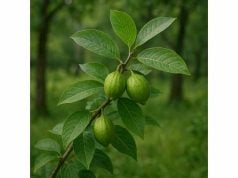
Macadamia, renowned for its rich, buttery flavor and impressive nutritional profile, has captured the interest of health enthusiasts and culinary experts alike. This versatile nut is prized not only for its delicious taste but also for its heart-healthy monounsaturated fats, antioxidants, and essential minerals. Macadamia’s unique bioactive compounds, including omega-7 fatty acids and tocotrienols, contribute to improved cardiovascular health, reduced inflammation, and enhanced skin vitality. Traditionally used in gourmet cooking and modern wellness applications, macadamia also features in cosmetic formulations for its moisturizing properties. This comprehensive guide delves into its botanical origins, chemical makeup, health benefits, practical uses, and recent scientific studies, offering an all-encompassing view of this extraordinary nut.
Table of Contents
- Botanical Profile and Morphological Features
- Phytochemical Composition and Key Active Compounds
- Comprehensive Health Benefits and Nutritional Attributes
- Culinary Applications and Safety Guidelines
- Scientific Research and Recent Study Insights
- Frequently Asked Questions
Botanical Profile and Morphological Features
Macadamia trees (Macadamia integrifolia and Macadamia tetraphylla being the most common species) are evergreen, flowering plants native to Australia but are now cultivated in many warm-climate regions worldwide. These trees can reach heights of up to 15 meters, boasting dense, glossy green leaves with an elliptical shape and a slightly leathery texture. The flowers are small, creamy white, and arranged in clusters, attracting pollinators such as bees, which facilitate the fertilization process essential for nut development.
The nut itself is encased in a hard, woody shell and is known for its rich, smooth kernel that has a subtle, buttery flavor. The outer husk of the macadamia fruit is fibrous, and once removed, reveals the prized kernel inside. These trees thrive in well-drained soils and are particularly suited to subtropical and tropical climates. They require moderate rainfall and are sensitive to frost, which is why they flourish in regions such as Hawaii, California, and parts of South Africa, as well as their native Australia.
Macadamia trees exhibit an impressive lifespan, with some specimens living for several decades and continuing to produce quality nuts long after maturity. Their robust root systems help them access deep water reserves, making them resilient during periods of drought. The slow-growing nature of these trees means that once established, they offer a sustainable source of nutritious nuts over many years.
Historically, indigenous Australian communities have utilized macadamia nuts as a food source long before commercial cultivation began. Early European settlers also recognized their potential, and by the early twentieth century, macadamia cultivation was introduced to other parts of the world. Today, macadamia nuts are celebrated not only for their culinary versatility but also for their significant health benefits, contributing essential nutrients such as monounsaturated fats, fiber, and antioxidants to the modern diet.
Researchers and agricultural experts continue to study macadamia trees to improve yields, enhance nut quality, and adapt cultivation practices to diverse environments. Advances in horticulture have led to the development of improved cultivars that offer higher nut quality and resistance to pests and diseases. Furthermore, sustainable farming practices are being implemented to ensure that macadamia cultivation does not compromise local ecosystems, emphasizing organic methods and water conservation techniques.
The botanical profile of macadamia also highlights its ecological importance. Macadamia orchards provide habitat and food sources for various insects and birds, contributing to local biodiversity. Additionally, the tree’s dense canopy offers shade and helps prevent soil erosion, making it a valuable component in agroforestry systems. As global demand for healthy, sustainable foods increases, the macadamia tree stands out as a prime example of a crop that balances economic value with environmental stewardship.
In summary, the botanical characteristics and morphological features of the macadamia tree underscore its adaptability, longevity, and nutritional promise. From its glossy leaves and clustered flowers to its resilient growth habits and nutrient-rich nuts, the macadamia tree is a marvel of nature. Its evolution from a wild food source in Australia to a globally recognized superfood illustrates the dynamic interplay between traditional practices and modern agricultural innovation, setting the stage for a deeper exploration of its chemical constituents and health benefits in the sections that follow.
Phytochemical Composition and Key Active Compounds
The exceptional health benefits of macadamia nuts stem from their rich phytochemical composition. These nuts contain a unique blend of bioactive compounds that contribute to their nutritional value and therapeutic properties. Here is an in-depth exploration of the primary active compounds found in macadamia nuts:
- Monounsaturated Fats (Oleic Acid and Palmitoleic Acid)
Macadamia nuts are particularly high in monounsaturated fats, notably oleic acid and palmitoleic acid. These fats are known to support cardiovascular health by reducing levels of bad cholesterol (LDL) and increasing good cholesterol (HDL). Palmitoleic acid, in particular, is recognized as an omega-7 fatty acid that plays a role in regulating metabolic functions and supporting skin health. The balanced composition of these fats makes macadamia nuts a heart-friendly snack. - Tocotrienols and Tocopherols (Vitamin E Complex)
As potent antioxidants, tocotrienols and tocopherols are forms of vitamin E that help protect cells from oxidative stress. These compounds neutralize free radicals, reducing inflammation and lowering the risk of chronic diseases. The antioxidant activity of vitamin E in macadamia nuts also supports skin health and may contribute to slowing the aging process by mitigating the damage caused by environmental stressors. - Phytosterols
Phytosterols are plant-derived sterols that closely resemble cholesterol in structure but function to reduce cholesterol absorption in the digestive tract. By competing with dietary cholesterol, these compounds help lower blood cholesterol levels, contributing to improved cardiovascular health. Beta-sitosterol is one of the most abundant phytosterols in macadamia nuts, providing anti-inflammatory benefits and supporting prostate health. - Minerals (Magnesium, Manganese, and Copper)
Macadamia nuts are a rich source of essential minerals. Magnesium plays a crucial role in muscle and nerve function, while manganese is important for bone health and metabolic processes. Copper contributes to the formation of collagen and supports the immune system. Together, these minerals help maintain overall bodily functions and support the body’s antioxidant defense systems. - Polyphenols and Flavonoids
Polyphenols and flavonoids are natural compounds known for their anti-inflammatory and antioxidant properties. In macadamia nuts, these compounds help combat oxidative stress and may reduce the risk of chronic illnesses such as heart disease and certain cancers. They also contribute to the nut’s subtle, distinctive flavor profile, enhancing its culinary appeal. - Dietary Fiber
Although not a “phytochemical” in the strictest sense, dietary fiber is an essential component of macadamia nuts that aids digestion and helps regulate blood sugar levels. Fiber promotes satiety, supports gut health, and contributes to overall metabolic balance, making macadamia nuts a beneficial addition to a healthy diet.
The synergy among these compounds creates a powerful nutritional profile that supports various aspects of health. For instance, the combination of monounsaturated fats and phytosterols helps maintain cardiovascular health by improving cholesterol profiles and reducing inflammation. Simultaneously, the antioxidant properties of tocotrienols, tocopherols, and polyphenols work together to protect cells from damage and support healthy aging.
Advanced analytical techniques, including high-performance liquid chromatography (HPLC) and gas chromatography-mass spectrometry (GC-MS), have enabled scientists to precisely quantify these bioactive compounds in macadamia nuts. Such detailed profiling is crucial for standardizing macadamia-based products and ensuring that consumers receive consistent health benefits. Variations in soil composition, climate, and cultivation practices can influence the concentration of these compounds, underscoring the importance of sustainable agricultural practices.
Ongoing research continues to explore the specific mechanisms by which these bioactive compounds exert their effects. For example, studies are examining how palmitoleic acid modulates inflammatory pathways and influences lipid metabolism, while others are investigating the role of vitamin E compounds in skin regeneration and neural protection. These insights not only validate traditional uses of macadamia nuts but also pave the way for innovative applications in both the food and cosmetic industries.
In summary, the phytochemical composition of macadamia nuts represents a harmonious blend of healthy fats, antioxidants, phytosterols, minerals, and fiber. Each component plays a unique role in enhancing the nut’s health benefits, from supporting cardiovascular function to promoting skin health and overall well-being. This intricate matrix of bioactive compounds not only defines the nutritional superiority of macadamia nuts but also positions them as a key ingredient in the pursuit of a balanced, healthful diet.
Comprehensive Health Benefits and Nutritional Attributes
Macadamia nuts are celebrated for their broad spectrum of health benefits, making them a prized addition to any balanced diet. Their rich nutritional profile, combined with potent bioactive compounds, contributes to a variety of positive health outcomes. This section explores the key health benefits and nutritional attributes associated with macadamia nuts.
Cardiovascular Health
Macadamia nuts are a powerhouse for heart health. Their high content of monounsaturated fats, particularly oleic and palmitoleic acids, helps improve lipid profiles by reducing low-density lipoprotein (LDL) cholesterol and raising high-density lipoprotein (HDL) cholesterol. Additionally, the presence of phytosterols contributes to further cholesterol reduction. Together, these components work synergistically to lower the risk of cardiovascular diseases, including heart attack and stroke. Regular consumption of macadamia nuts has been linked to improved arterial function and reduced inflammation, both of which are critical for maintaining heart health.
Antioxidant and Anti-inflammatory Effects
The antioxidants found in macadamia nuts, such as tocotrienols, tocopherols, polyphenols, and flavonoids, play a significant role in neutralizing free radicals. By reducing oxidative stress, these compounds help protect cells from damage, slow down the aging process, and lower the risk of chronic diseases. The anti-inflammatory properties of these antioxidants can also ease symptoms associated with inflammatory conditions such as arthritis and may contribute to better overall immune function.
Metabolic and Weight Management Support
Despite their high-calorie content, macadamia nuts have been shown to assist in weight management. The fiber and healthy fats in these nuts promote satiety, reducing overall calorie intake by curbing hunger. Additionally, the monounsaturated fats help regulate blood sugar levels and improve insulin sensitivity, which are critical factors in metabolic health. Including macadamia nuts as part of a balanced diet may therefore aid in preventing metabolic syndrome and type 2 diabetes.
Brain and Cognitive Health
Emerging research suggests that the omega-7 fatty acids and antioxidants in macadamia nuts may support brain health. These nutrients help reduce neuroinflammation and oxidative stress, which are associated with cognitive decline and neurodegenerative diseases. Regular consumption of macadamia nuts might contribute to enhanced memory, better concentration, and overall improved cognitive function.
Skin and Hair Vitality
The vitamin E complex and healthy fats present in macadamia nuts are highly beneficial for skin and hair. These nutrients help maintain skin elasticity, reduce the appearance of fine lines, and protect against UV-induced damage. The moisturizing properties of macadamia oil are frequently utilized in cosmetic products to nourish and rejuvenate both skin and hair, promoting a radiant appearance and healthy scalp.
Bone Health and Mineral Support
Macadamia nuts are an excellent source of essential minerals such as magnesium, manganese, and copper. These minerals are vital for maintaining bone density and overall skeletal health. Magnesium, in particular, is known to play a key role in bone formation and calcium absorption. Adequate intake of these nutrients helps prevent osteoporosis and supports overall musculoskeletal health.
Digestive Health
The dietary fiber in macadamia nuts aids in digestion by promoting regular bowel movements and supporting a healthy gut microbiome. A fiber-rich diet can help prevent constipation and may also reduce the risk of developing gastrointestinal disorders. By enhancing digestive health, macadamia nuts contribute to overall well-being and improved nutrient absorption.
In addition to these specific benefits, macadamia nuts offer a balanced blend of macronutrients that provide sustained energy throughout the day. Their combination of healthy fats, protein, and fiber makes them an ideal snack for maintaining steady blood sugar levels and avoiding energy crashes.
The multifaceted health benefits of macadamia nuts are supported by both traditional dietary practices and modern scientific research. Their role in promoting cardiovascular health, reducing inflammation, supporting metabolic processes, and enhancing cognitive and skin health makes them a valuable addition to any wellness regimen. Integrating macadamia nuts into daily dietary practices—whether as a standalone snack, incorporated into recipes, or used in the form of oil—can contribute significantly to long-term health and vitality.
Culinary Applications and Safety Guidelines
Macadamia nuts have long been cherished not only for their delectable flavor but also for their versatile culinary applications and nutritional benefits. Their creamy texture and rich taste make them a favorite ingredient in both savory and sweet dishes, as well as in non-food products. However, as with any potent natural food, it is important to observe proper usage and safety guidelines to maximize benefits and minimize risks.
Culinary Uses and Preparation Techniques
- Raw and Roasted Snacks:
Macadamia nuts can be enjoyed raw or lightly roasted to enhance their buttery flavor and crunchy texture. Roasting at low temperatures preserves their nutritional integrity while deepening their taste, making them a popular snack on their own or as a topping for salads and desserts. - Baking and Cooking:
Finely chopped or ground macadamia nuts can be incorporated into baked goods such as cookies, cakes, and bread, providing a rich, nutty flavor. Their natural oils lend moisture and tenderness to pastries. In savory dishes, they can be used to create crunchy coatings for fish or chicken, added to stir-fries, or blended into sauces to enrich the flavor profile. - Nut Butters and Oils:
Macadamia nut butter is a smooth, spreadable alternative to traditional peanut or almond butter, ideal for toast, smoothies, and dips. Macadamia oil, extracted from the nuts, is prized for its high smoke point and is used in salad dressings, marinades, and as a finishing oil to enhance the flavor of various dishes. Its skin-friendly properties also make it a staple ingredient in cosmetic formulations. - Desserts and Confections:
The natural sweetness and rich flavor of macadamia nuts make them a delightful addition to chocolates, ice creams, and confectionery items. They provide texture and a luxurious taste, often featured in gourmet recipes and high-end desserts.
Recommended Serving Sizes and Usage Tips
- Portion Control:
Although macadamia nuts are nutrient-dense, they are also calorie-rich. A typical serving size is about 1 ounce (approximately 10–12 nuts), which provides a balanced mix of healthy fats, protein, and fiber. Moderation is key to reaping their health benefits without consuming excess calories. - Integrating into Meals:
To enjoy the benefits of macadamia nuts without disrupting your overall diet, consider adding them to meals in small quantities. They can be sprinkled over yogurt, mixed into oatmeal, or used as a topping for fruit salads to enhance both nutrition and taste. - Storage and Freshness:
Due to their high oil content, macadamia nuts are prone to rancidity if not stored properly. Keep them in an airtight container in a cool, dark place or refrigerate them to maintain freshness and nutritional value over time.
Safety Considerations and Allergic Reactions
While macadamia nuts are generally safe for most individuals, certain precautions should be observed:
- Nut Allergies:
Individuals with tree nut allergies should exercise caution when consuming macadamia nuts. Allergic reactions can range from mild to severe, including symptoms such as itching, swelling, and difficulty breathing. If you suspect an allergy, consult with a healthcare provider before incorporating macadamia nuts into your diet. - Caloric Density:
Given their high calorie and fat content, overconsumption of macadamia nuts may contribute to weight gain if not balanced with other dietary components. It is important to monitor portion sizes, particularly if you are managing your calorie intake for weight loss or maintenance. - Interactions with Medications:
There is limited evidence regarding interactions between macadamia nuts and medications. However, if you are taking medications that affect lipid metabolism or have specific dietary restrictions, it is advisable to consult with your healthcare provider to ensure that macadamia nut consumption is appropriate for your individual health needs. - Digestive Considerations:
While the fiber content in macadamia nuts promotes digestive health, excessive consumption may cause gastrointestinal discomfort in some individuals. Starting with smaller portions and gradually increasing intake can help your body adjust.
Best Practices for Incorporation
To maximize the benefits of macadamia nuts while ensuring safety, consider the following best practices:
- Consult a Nutritionist:
If you are new to incorporating macadamia nuts into your diet or have specific health concerns, consulting a nutritionist can help tailor an appropriate serving plan. - Opt for High-Quality Products:
Choose organic, non-GMO macadamia nuts from reputable sources to ensure purity and avoid contaminants. - Experiment with Recipes:
Explore various culinary techniques to integrate macadamia nuts into your diet. From raw snacks to sophisticated dishes, diverse preparation methods can keep your meals exciting and nutritionally balanced. - Monitor Your Body’s Response:
Pay attention to any changes in digestion, energy levels, or overall well-being when introducing macadamia nuts into your diet, and adjust serving sizes as needed.
By embracing these culinary applications and safety guidelines, you can enjoy the myriad benefits of macadamia nuts while maintaining a balanced and healthful diet. Their versatility not only enhances the flavor and nutritional value of your meals but also contributes to overall wellness.
Scientific Research and Recent Study Insights
Over the past decades, numerous scientific studies have investigated the health benefits and chemical properties of macadamia nuts. The research spans several disciplines—from nutrition and cardiovascular health to dermatology and metabolic studies—shedding light on the mechanisms that underpin their positive effects. Below is a summary of significant studies that illustrate the breadth of macadamia research:
- Study on Cardiovascular Benefits (2010)
A clinical trial published in the Journal of Nutrition evaluated the effects of regular macadamia nut consumption on lipid profiles. The study found that participants who included a daily serving of macadamia nuts in their diet experienced significant reductions in LDL cholesterol and improvements in overall heart health. The researchers attributed these changes to the high levels of monounsaturated fats and phytosterols in the nuts, suggesting that macadamia consumption can be an effective dietary strategy for cardiovascular disease prevention. - Investigation into Antioxidant Properties (2013)
Research featured in Food Chemistry analyzed the antioxidant capacity of macadamia nuts, focusing on their tocotrienol and polyphenol content. The study demonstrated that macadamia nuts exhibit robust free radical scavenging activity, which helps protect cells from oxidative stress. These findings support the role of macadamia nuts in reducing inflammation and may have implications for the prevention of age-related diseases. - Examination of Metabolic Effects and Weight Management (2015)
A study published in Obesity Research & Clinical Practice explored the impact of macadamia nut consumption on metabolic parameters in overweight individuals. Results indicated that incorporating macadamia nuts into a calorie-controlled diet improved insulin sensitivity, reduced inflammation, and promoted modest weight loss. The study highlighted the benefits of the nuts’ dietary fiber and healthy fat profile in regulating blood sugar and metabolism. - Research on Skin Health and Cosmetic Applications (2018)
A pilot study in the Journal of Cosmetic Dermatology investigated the effects of topical macadamia oil on skin hydration and elasticity. The findings revealed that the high concentration of fatty acids and vitamin E in macadamia oil significantly improved skin moisture levels and reduced signs of aging. These results have encouraged further exploration of macadamia derivatives in cosmetic formulations and dermatological treatments. - Comprehensive Review of Nutritional and Functional Benefits (2020)
A systematic review published in Nutrients consolidated findings from multiple studies on the health benefits of macadamia nuts. The review concluded that regular consumption of macadamia nuts is associated with improved cardiovascular health, enhanced metabolic function, and potential neuroprotective effects. It emphasized the need for further research to establish optimal dosages and long-term outcomes, highlighting macadamia nuts as a promising functional food.
These studies collectively underscore the scientific basis for many of the traditional and modern uses of macadamia nuts. The robust evidence supporting cardiovascular, metabolic, and dermatological benefits has helped elevate macadamia nuts from a gourmet ingredient to a recognized component of a health-conscious diet. As research continues to evolve, further insights are expected to refine our understanding of the mechanisms by which macadamia nuts promote health and to expand their applications in both nutrition and medicine.
Frequently Asked Questions
FAQ: What are macadamia nuts and where do they originate?
Macadamia nuts are edible seeds produced by evergreen trees native to Australia. Today, they are cultivated in various warm-climate regions worldwide and are prized for their rich, buttery flavor and nutritional benefits.
FAQ: What are the key health benefits of consuming macadamia nuts?
Macadamia nuts support cardiovascular health through heart-friendly monounsaturated fats, provide antioxidants for reduced inflammation, aid in metabolic balance, and offer essential minerals and fiber that promote overall wellness.
FAQ: How can macadamia nuts be incorporated into a daily diet?
They can be enjoyed as a raw or roasted snack, added to salads, baked goods, or used to produce macadamia oil and nut butter. Their versatility makes them a valuable addition to both sweet and savory dishes.
FAQ: Are there any safety concerns associated with macadamia nut consumption?
Macadamia nuts are generally safe for most people; however, individuals with tree nut allergies should avoid them. Due to their high-calorie content, moderation is recommended for those managing calorie intake.
FAQ: What scientific evidence supports the health benefits of macadamia nuts?
Numerous studies have demonstrated that macadamia nuts improve lipid profiles, reduce oxidative stress, support metabolic health, and enhance skin vitality. These findings are published in reputable journals such as the Journal of Nutrition and Food Chemistry.
Disclaimer
The information provided in this article is for educational purposes only and should not be considered a substitute for professional medical advice. Always consult with a qualified healthcare provider before making any significant changes to your diet or supplement regimen.
Please share this article on Facebook, X (formerly Twitter), or your preferred social networks, and follow us on social media for more insightful updates on nutrition and wellness.










